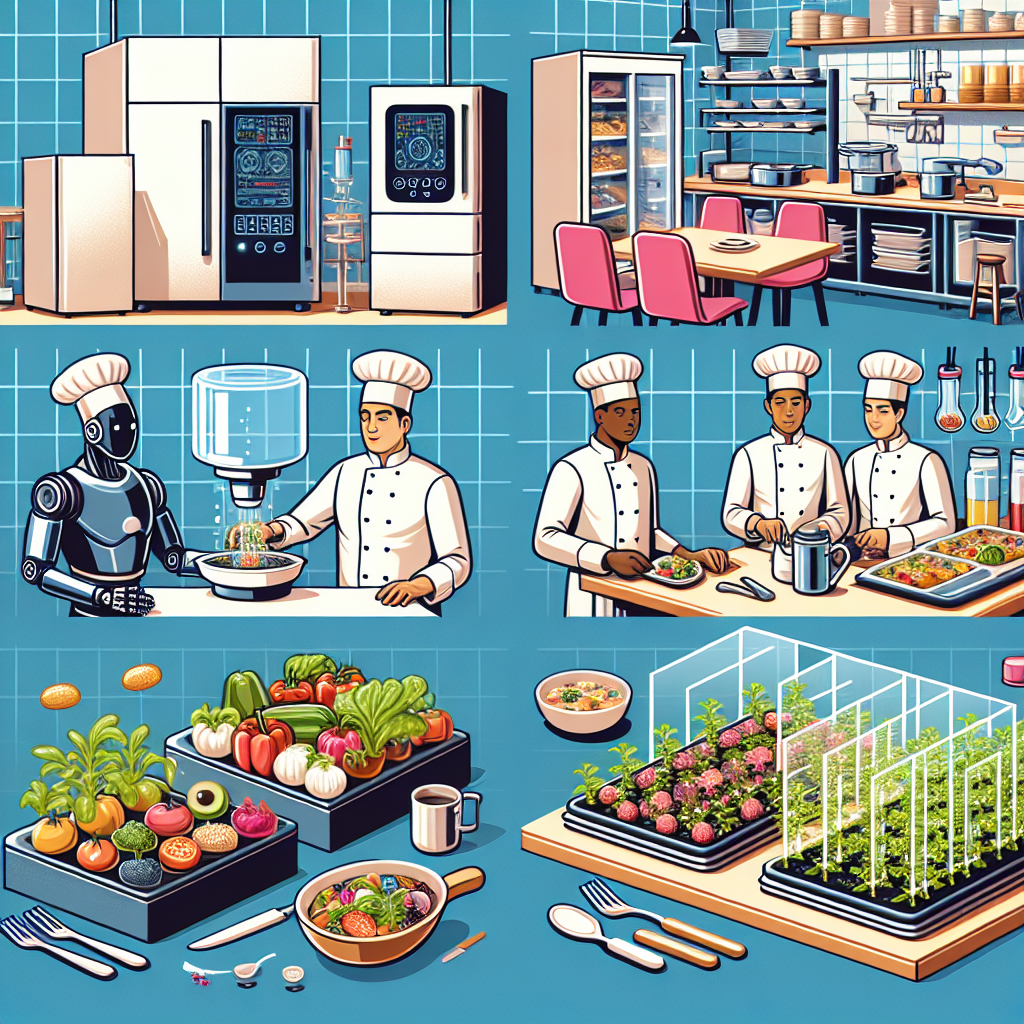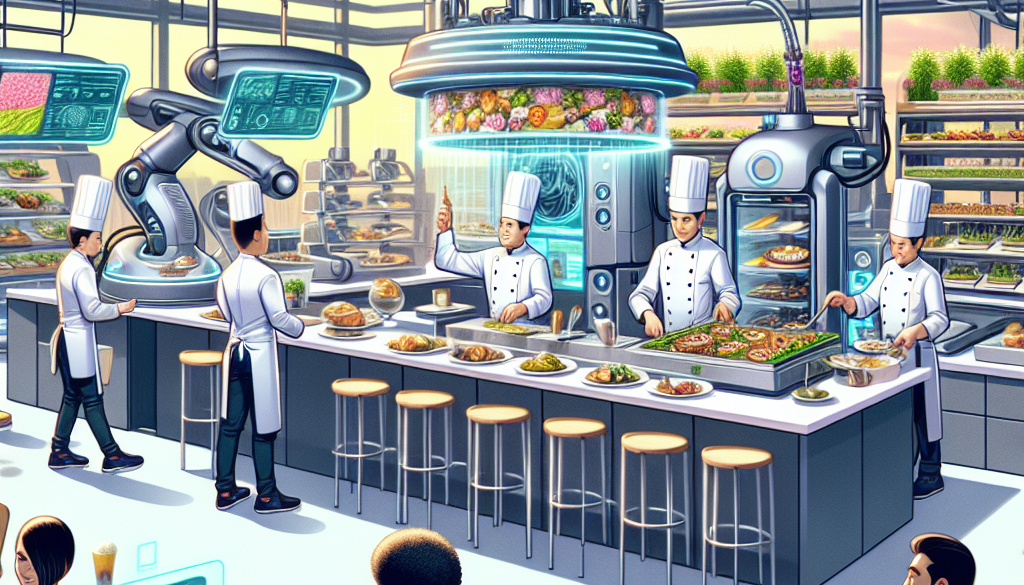Future Foodservice Industry Trends to Watch
-
Table of Contents
Future Foodservice Industry Trends to Watch

The foodservice industry is a dynamic and ever-evolving sector, shaped by changing consumer preferences, technological advancements, and global economic trends. As we look to the future, several key trends are poised to redefine the way food is prepared, served, and enjoyed. In this article, we will explore the most significant trends that are expected to impact the foodservice industry in the coming years.
1. Sustainability and Ethical Sourcing
Consumers are increasingly concerned about the environmental impact of their food choices. This has led to a surge in demand for sustainably sourced and ethically produced ingredients. Foodservice providers are responding by:
- Offering more plant-based menu options to cater to vegetarians, vegans, and flexitarians.
- Implementing waste reduction strategies, such as composting and recycling programs.
- Sourcing ingredients from local farmers and suppliers to reduce carbon footprint.
Statistics show that the plant-based food market is expected to grow at a compound annual growth rate (CAGR) of 11.9% from 2020 to 2027, indicating a significant shift towards meat alternatives in the foodservice industry.
2. Technology Integration
Technology is revolutionizing the foodservice industry, from the way orders are taken to how food is delivered. Key technological trends include:
- Adoption of artificial intelligence (AI) for personalized menu recommendations and customer service.
- Use of robotics for food preparation and delivery, enhancing efficiency and reducing labor costs.
- Implementation of contactless payment systems and mobile ordering to streamline the customer experience.
According to a report, 95% of restaurateurs agree that technology improves business efficiency, highlighting the critical role of tech in the industry’s future.
3. Health and Wellness Focus
Health-conscious consumers are driving the demand for nutritious and functional foods. Foodservice operators are adapting by:
- Incorporating superfoods and ingredients with health benefits into their menus.
- Offering transparent nutritional information and calorie counts to empower customers to make informed choices.
- Creating menus that cater to specific dietary needs, such as gluten-free, keto, and paleo diets.
Market research indicates that the global functional food market is projected to reach $275.77 billion by 2025, signifying the growing importance of health in foodservice offerings.
4. Experiential Dining
Experiential dining is about creating memorable experiences that go beyond the food on the plate. Restaurants are focusing on:
- Offering interactive dining experiences, such as chef’s tables and cooking classes.
- Designing unique and Instagram-worthy restaurant interiors to attract social media-savvy diners.
- Hosting themed events and pop-ups to create buzz and draw in new customers.
As per industry insights, 72% of millennials prefer to spend money on experiences rather than material items, underscoring the potential of experiential dining.
5. Ghost Kitchens and Delivery Services
The rise of delivery apps and online ordering has led to the emergence of ghost kitchens—commercial cooking spaces without dine-in facilities. This trend is characterized by:
- Lower overhead costs for foodservice operators, as there is no need for front-of-house staff or dining space.
- Partnerships with third-party delivery services to reach a wider customer base.
- Flexibility to quickly adapt to changing consumer tastes and market demands.
Industry forecasts predict that the global ghost kitchen market will reach $71.4 billion by 2027, demonstrating the rapid growth of this segment.
6. Food Safety and Transparency
Food safety concerns and the desire for transparency are driving changes in the foodservice industry. Operators are focusing on:
- Implementing advanced tracking and tracing technologies to ensure food safety from farm to table.
- Providing detailed information about ingredient sourcing and production methods.
- Adhering to strict hygiene and sanitation standards to build consumer trust.
With 69% of consumers stating that transparency is an important factor in their purchasing decisions, the emphasis on food safety and transparency is clear.
Conclusion
The foodservice industry is set to undergo significant transformations in the near future. Sustainability, technology, health, experiential dining, ghost kitchens, and transparency are the key trends to watch. These trends reflect a broader shift towards a more ethical, efficient, and customer-centric approach to foodservice. As the industry continues to innovate, these trends will shape the way we think about dining out, ordering in, and enjoying food in all its forms.
ETprotein’s Role in Future Foodservice Trends
ETprotein is well-positioned to support the foodservice industry’s shift towards sustainability and health. Their range of organic bulk vegan proteins and L-(+)-Ergothioneine (EGT) products align with the growing demand for plant-based and functional ingredients. ETprotein’s offerings can help foodservice operators tap into the health and wellness trend by providing high-quality, non-GMO, allergen-free protein options. With a commitment to excellence and a diverse product range, ETprotein is an ideal partner for businesses looking to innovate and stay ahead of future foodservice trends.
About ETprotein:
ETprotein, a reputable protein and L-(+)-Ergothioneine (EGT) Chinese factory manufacturer and supplier, is renowned for producing, stocking, exporting, and delivering the highest quality organic bulk vegan proteins and L-(+)-Ergothioneine. They include Organic rice protein, clear rice protein, pea protein, clear pea protein, watermelon seed protein, pumpkin seed protein, sunflower seed protein, mung bean protein, peanut protein, and L-(+)-Ergothioneine EGT Pharmaceutical grade, L-(+)-Ergothioneine EGT food grade, L-(+)-Ergothioneine EGT cosmetic grade, L-(+)-Ergothioneine EGT reference grade and L-(+)-Ergothioneine EGT standard. Their offerings, characterized by a neutral taste, non-GMO, allergen-free attributes, with L-(+)-Ergothioneine purity over 98%, 99%, cater to a diverse range of industries. They serve nutraceutical, pharmaceutical, cosmeceutical, veterinary, as well as food and beverage finished product distributors, traders, and manufacturers across Europe, USA, Canada, Australia, Thailand, Japan, Korea, Brazil, and Chile, among others.
ETprotein specialization includes exporting and delivering tailor-made protein powder and finished nutritional supplements. Their extensive product range covers sectors like Food and Beverage, Sports Nutrition, Weight Management, Dietary Supplements, Health and Wellness Products, and Infant Formula, ensuring comprehensive solutions to meet all your protein needs.
As a trusted company by leading global food and beverage brands and Fortune 500 companies, ETprotein reinforces China’s reputation in the global arena. For more information or to sample their products, please contact them and email sales(at)ETprotein.com today.












